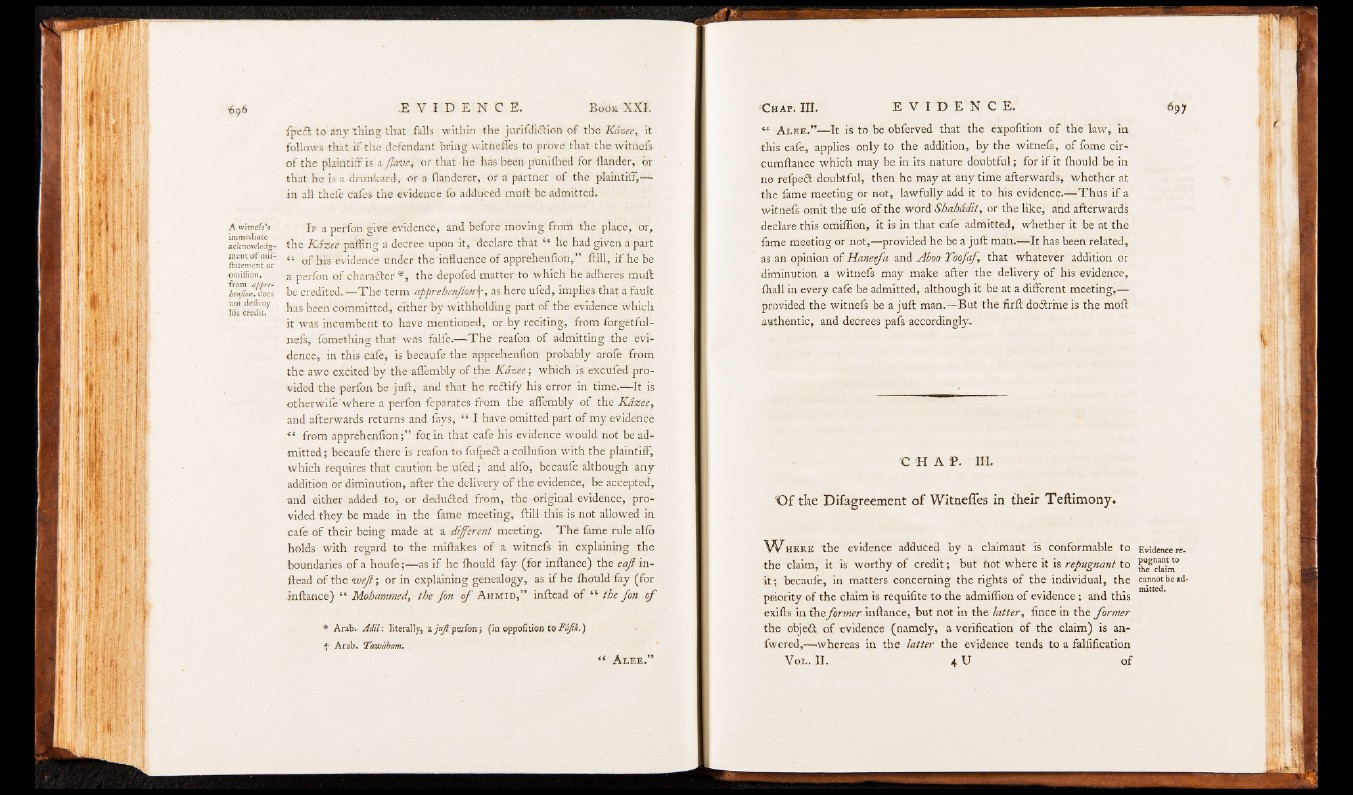
fp'e® to’ any thing that falls within the jurifdidtiofr of the Kâzee, it
follows that if the defendant bring witneffes to prove' that the witnefs
of the plaintiff is ijld v ci or that he haS-been pumlhed for Hander, or
that he is a drunkard , Or a flanderer, or a partnef of the plaintiff,—
in all thefe cafes thé evidence fo adduced muff be admitted.
A witnefs’«
immediate
acknowledgment
of mif-
flatement or
omiflion,
from appre-
henjion, does
not deftroy
his credit.
Ip a perfon give evidence* and before moving from the place, or,
the Kâzee palling a decree upon it, declare that “ he had given a part
“ of his évidence under the influence of apprehenfioti,” ffill, if he be
a perfon of character * , the depofed matter to which he adheres muff
be credited.— The term apprehenfion-p, as here ufed, implies that a fault
has been committed, either by withholding part of the evidence which
it was incümbent to have mentioned, or by reciting, from forgetful-
nefs, fomething that was falfe.— The reafon of admitting the evidence,
in this cafe, is becaufe the apprehenfion probably arofe from
the awe excited by the affembly of the Kâzee; which is excufed provided
the perfon be juft, and that he reCtify his error in time.— It is
otherwife'where a perfon feparates from the affembly of the Kâzee,
and afterwards returns and fays, “ I have omitted part of my evidence
from apprehenfion;” fotin that cafe his evidence would not be admitted;
becaufe there is reafon to fufpeCt a collufion with the plaintiff,
which requires that caution be ufed ; and alfo, becaufe although any
addition or diminution, after the delivery of the evidence, be accepted,
and either added to, or deduced from, the original evidence, provided
they be made in the fame meeting, ffill this is not allowed in
cafe of their being made at a -different meeting. The fame rule alfo
holds with regard to the miftakes of a witnefs in explaining the
boundaries o f a hdufe;— as if he fhould fay (for inftance) the eajl in-
ftead of the moefi ; or in explaining genealogy, as if he fhould fay (for
inftance) “ Mohammed, the fon o f Ahmid,” inftead of “ the fon o f
* Arab. Adil: literally, aya/? perfon; (in oppoftion to Fâfik.)
f Arab.. Tavuàham,
“ A lee.’
« A lee.”— It is to be obferved that the expofition of the law, in
•this cafe, applies only to the addition, by the witnefs, of fome cir-
cumftance which may be in its nature doubtful; for i f it Ihould be in
ne refpeft doubtful, then he may at any time afterwards, whether at
the fame meeting or not, lawfully add it to his evidence.— Thus if a
witnefs omit the ufe of the word Shahadit, or the like, and afterwards
declare this omiflion, it is in that cafe admitted, whether it be at the
fame meeting or not,—provided he be a juft man.— It has been related,
as an opinion o f Haneefa and Aboo Toofcf, that whatever addition or
diminution a witnefs may make after the delivery of his evidence,
fhall in every cafe be admitted, although it be at a different meeting,—
provided the witnefs be a juft man.— But the firft doCtrine is the moft
authentic, and decrees pafs accordingly-
C II A P. III.
O f the Difagreement of WitneiTes in their Teftimony.
W h e r e the evidence adduced by a claimant is conformable to Evidence re-
the claim, it is worthy of credit-; but not where it is repugnant to
it; becaufe, in matters concerning the rights of the individual, the cannot be ad-
priority of the claim is requifite to the admilfion of evidence; and this
exifts in theformer inftance, but not in the latter, fince in the former
the objedt of evidence (namely, a verification of the claim) is an-
fwered,— whereas in the latter the evidence tends to a fabrication
V o l . II. 4 U of